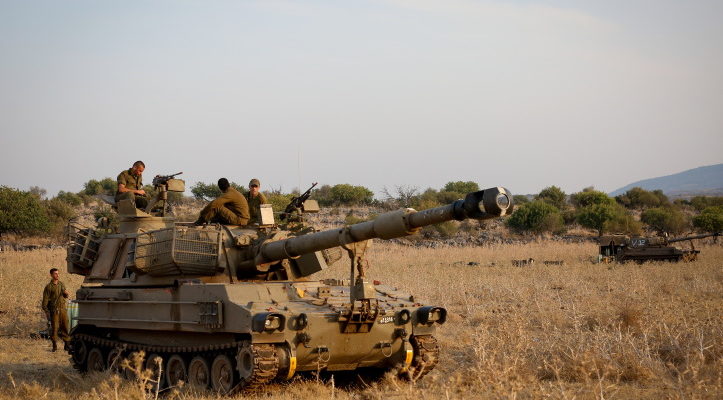Israeli special forces and other units have launched incursions into Southern Lebanon, utilizing both tunnels and surface routes, focusing on preparing the area for a larger-scale invasion.
By Gregg Roman, Middle East Forum
Israel has initiated a significant ground invasion into southern Lebanon, marking a dramatic escalation in its conflict with Hezbollah. This move, approved by the Israeli Security Cabinet, represents a substantial shift in Israel’s war strategy.
The invasion follows a series of highly effective operations that have severely weakened Hezbollah’s capabilities.
In a groundbreaking move, Israel detonated thousands of Hezbollah’s communication devices, including pagers and walkie-talkies, in a single coordinated strike.
This operation disrupted Hezbollah’s command and control structures, leaving 1,500 militants out of commission.
The IDF followed this with a precision strike that eliminated Hezbollah’s leader, Hassan Nasrallah, along with 31 senior commanders, decapitating the organization’s leadership.
These preemptive actions set the stage for the current ground invasion, significantly reducing Hezbollah’s ability to mount an effective defense or counterattack.
The Israel Defense Forces (IDF) confirmed that “several hours ago, Israeli forces began ‘limited, localized, and targeted’ raids against Hezbollah terror targets in the border area of southern Lebanon.”
However, the scale and intensity of the operation suggest a more extensive campaign than initially indicated.
The Commanding Officer of the IDF Northern Command, Major General Ori Gordin, has met with the commanders of the 98th, 91st, and 36th Divisions to approve plans for an expansion of fighting in the North, indicating a well-coordinated and potentially prolonged operation.
Israeli special forces and other units have launched incursions into Southern Lebanon, utilizing both tunnels and surface routes. These raids focus on preparing the area for a larger-scale invasion, targeting Hezbollah’s military infrastructure along the border.
The IDF has deployed M109A5 “Dohar” 155mm Self-Propelled Howitzers in the Upper Galilee region, providing sustained artillery support for advancing troops. This multi-pronged assault aims to dismantle Hezbollah’s rocket launchers, weapons stockpiles, and underground facilities.
The invasion has already yielded significant results. The IDF announced the elimination of Eid Hassan Nashar, the commander of Hezbollah’s medium-range rocket force, in a precision strike on the southern suburbs of Beirut.
Israel has neutralized all senior leaders within Hezbollah’s rocket and missile force, including several regional commanders and officers.
The conflict has expanded beyond Lebanon’s borders. Israeli airstrikes targeted the Mezzeh district of southwestern Damascus, likely a targeted assassination attempt.
Syrian state media claimed that air defenses engaged at least three waves of Israeli airstrikes on the capital. This cross-border operation demonstrates Israel’s commitment to disrupting Hezbollah’s support networks across the region.
Israel’s technological prowess has played a crucial role in the operation. The IDF successfully intercepted multiple rocket launches from Lebanon, including Hezbollah’s “Noor” short-range ballistic missile fired at the town of Kfar Giladi.
Additionally, the Israeli Air Force neutralized an unmanned aerial vehicle dozens of kilometers off Israel’s central coast near Tel Aviv, showcasing its extended defensive capabilities.
The invasion has had immediate effects on the ground. The Lebanese Army has withdrawn from several positions along the border, redeploying near the Litani River.
UNIFIL (United Nations Interim Force in Lebanon) forces have also begun evacuating their positions near the border. This withdrawal creates a power vacuum that Israel aims to fill to ensure its security objectives.
The escalation has directly impacted Israeli civilians. The IDF has declared a closed military area near the communities of Metula, Meshgav Am, and Kfar Giladi in the Upper Galilee region.
Residents in Kiryat Shmona and other northern communities must stay near protected areas until further notice. Red alert sirens have sounded in various locations, including Meron, Shatula, and Zarit, as Hezbollah continues to launch rockets into northern Israel.
The international community has responded swiftly to this significant development. The Pentagon is deploying several thousand more American troops along with fighter planes to the Middle East, underscoring the potential for broader regional implications.
The German Embassy in Beirut has announced the evacuation of non-essential staff and vulnerable German nationals from Lebanon.
Israel’s diplomatic efforts have been equally assertive. Foreign Minister Israel Katz has informed counterparts in several countries, including the United States and Germany, that there will be no ceasefire in Lebanon and that the campaign will only end with the dissolution of Hezbollah.
This stance underscores the operation’s ambitious goals and the potential for a prolonged conflict.
The economic dimension of this conflict remains crucial. Israel continues to target Hezbollah’s financial networks, drug trade, and banking connections in Lebanon, aiming to deprive the organization of its economic lifelines.
This multifaceted approach combines military action with aggressive economic warfare to cripple Hezbollah’s capabilities.
As the invasion unfolds, Israel faces the challenge of balancing military objectives with international opinion and the risk of wider regional conflict. The IDF’s efforts to minimize civilian casualties, exemplified by evacuation warnings issued to residents in Beirut’s Dahieh suburb, demonstrate an awareness of these concerns.
However, the intensity of the assault, including strikes near Rafic Hariri International Airport, indicates Israel’s determination to achieve its strategic goals regardless of international pressure.
This full-spectrum warfare against Hezbollah represents a paradigm shift in combating non-state actors. By simultaneously engaging on military, technological, economic, and diplomatic fronts, Israel is not just fighting Hezbollah’s current capabilities but dismantling its entire ecosystem.
The operation’s success or failure will likely influence global counter-terrorism strategies for years, potentially redefining how nations address threats from non-state actors with state-like military capabilities.
As the situation develops rapidly, all eyes are on southern Lebanon and Israel’s northern border. The coming days will be critical in determining the scope and duration of this operation and its impact on the broader Middle East landscape.
The international community, particularly the United States, must grapple with the implications of this escalation and its potential to reshape regional power dynamics.





